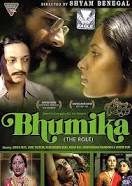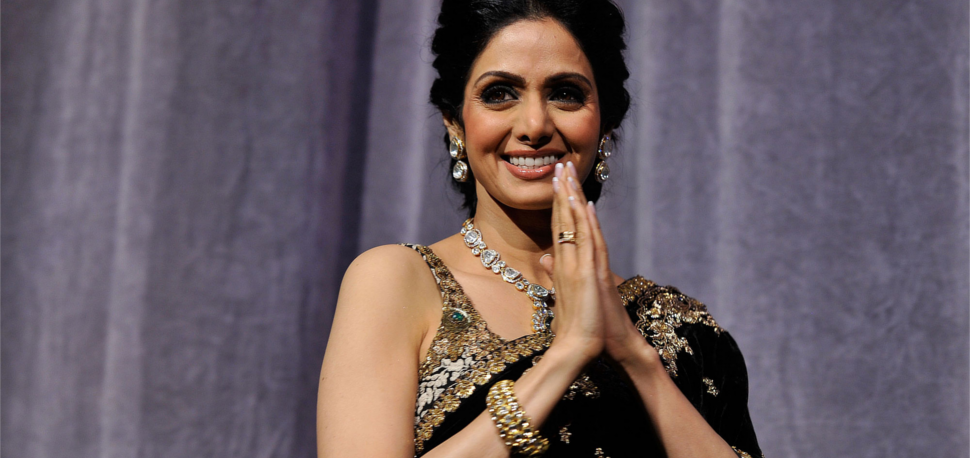Bhumika tells the life story of an actress, Usha (Smita Patil), who is the granddaughter of a famous female singer of the old tradition from Devadasi community of Goa. Ushas mother is married to an abusive and alcoholic Brahmin. Following his early death, and over her mothers objections, Usha is taken to Bombay by family hanger-on Keshav Dalvi (Amol Palekar) to audition successfully as a singer in a Bombay studio: the first step in a process, watched approvingly by Ushas doting grandmother and with horror by her mother, that will eventually carry her to on-camera adolescent stardom, and to an ill-starred love marriage with Keshav. Usha's motives for stubbornly pursuing this relationship (culminating in a pre-marital pregnancy) with the unattractive and much older Keshav who appears to have lusted after her since childhood are not spelled out. Presumably she feels indebted to him for his loyalty to her family (of which he frequently reminds her) and for her own worldly success; she is also a headstrong girl who clearly enjoys her acting career and is bent on challenging her uptight mother (who opposes the match because Keshav does not belong to their caste, just as she opposes cinema itself because of its presumed un-respectability).
Once the two are wed, Usha is shocked to find Keshav continuing to act as her “business managerâ€, (After effects) arranging starring roles for her opposite heartthrob Rajan (Anant Nag), who is himself in (unrequited) love with her. Since Keshavs other business ventures are unsuccessful, the family remains entirely dependent on Ushas earnings a fact that Keshav clearly resents. He thus becomes both a jealous husband with a fragile ego and nasty temper, as well as (in effect) a greedy pimp who compels his wife to take risqué work despite her dislike of her co-star and her protests that she only wants to be a housewife now that their daughter has been born. Not surprisingly, the relationship becomes increasingly poisoned, particularly by Keshavs suspicion (fed by star-magazine gossip) that she is having an affair with Rajan. Verbally and physically abused by her husband and periodically obliged to live in a hotel, separated from her daughter and mother, the desperately unhappy actress eventually does instigate two unsatisfying liaisons: with the nihilistic and self-centered director Sunil Verma (Naseeruddin Shah), with whom she plots a double-suicide (which he foils), and then with the wealthy businessman Vinayak Kale (Amrish Puri), who keeps her as a pampered mistress on his palatial estate.
Here Usha briefly finds a kind of respectability as a de facto second wife, earning a measure of love and admiration from Kales mother, son, and bedridden first wife but (as she learns one day when she tries to take the boy to a nearby fair) at the cost of even the most rudimentary freedom. Unable to abide by Kales hypocritical domestic rules, she finds her only hope of escape in the intervention of the hated Keshav, who promptly brings her back to a Bombay festooned with billboards of her own face, and to the same drab hotel and lonely prospects. As Kales bitter wife remarks to Usha as the latter prepares to leave, The beds change, the kitchens change. Mens masks change, but men dont change.â€The movie does not clarify the reason why Usha likes, and then dislikes Rajan.
The climax of the movie is gloomy, and the viewers are left on their own to seek its message.
Director :
Shyam Benegal
Cast :
Smita Patil, Naseeruddin Shah, Amrish Puri
Genre :
Drama
Producer :
Lalit M. Bijlani
Freni Variava
Release Date :
1977-11-11
Running Time :
142 min.
Music :
Vanraj Bhatia
Majrooh Sultanpuri, Vasant Dev (lyrics)







RIDDHIMAA
Howrah Bridge Pe Latakti Hui Lash
sharan
Movie Review: AE DIL HAI MUSHKIL (2016) - Bollywood's First Platonic Love Story
Sharad
Commando 2
amol
Force 2
Ultimate Free Lyrics
Rustom